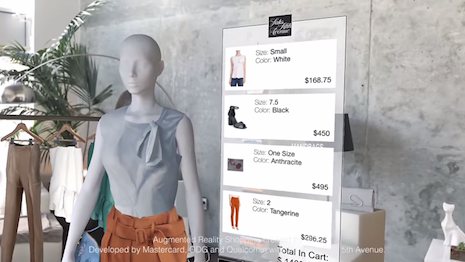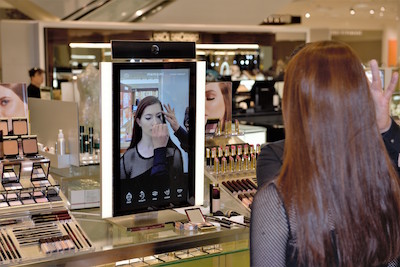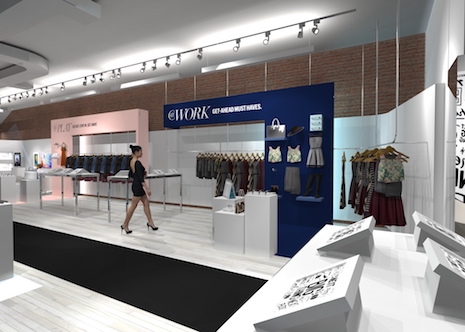 Mastercard and Saks bring AR to shopping, as retail becomes more integrated with tech
Mastercard and Saks bring AR to shopping, as retail becomes more integrated with tech Consumers today are more interested in the convenient services that automation can offer, but luxury brands will be the last to replace human interaction.
A new report on POS/Customer Engagement from Boston Retail Partners explains that the retail industry as a whole is moving towards technology-based personalized services that luxury brands are reluctant to offer. Shoppers are interested and willing to interact with automaton replacements for human counterparts in retail, as long as the experience still offers quality service.
“Retail and customer engagement models must transform,” said Brian Brunk, principal at BRP. “However, the legacy retail applications and infrastructure still in place at many retail organizations are not properly equipped to support changing retail models and continuously evolving customer expectations.
"To meet the demands of their customer, the retail winners in 2018 and beyond need to accelerate the transformation to cloud-based unified commerce. Victory belongs to the agile," he said.
BRP looked at responses from 500 top North American retailers in December of 2017 for the survey.
Robots versus people
Technology is now allowing retail to become more personal, with services that offer promotions based on customer context growing. About 17 percent of retailers have implemented services such as this, while 46 percent plan to include these strategies in the near future.
More retailers are also looking to integrate the Internet of Things into their stores, with 60 percent likely to include IoT within the next three years.
For instance, smart fitting rooms are becoming more popular with luxury department stores, allowing shoppers to interact with digital mirrors and motion sensors. About 10 percent of retailers have incorporated this high-tech fitting room strategy into their stores, allowing shoppers to easily find different sizes or interact with recommendations.
As an example, department store chain Neiman Marcus unveiled new retail concepts in cosmetics and fragrances at its opening in Fort Worth, TX.
The store, located within The Shops at Clearfork, incorporates a number of the retailer’s technological advances within its 90,000 square feet, including smart mirrors and a ChargeItSpot station. This opening is representative of Neiman Marcus’ ideas for the store of the future, which combines high tech and high touch (see more).
Neiman Marcus also introduces beauty counter smart mirrors. Image credit: Neiman Marcus
Retailers’ interpretations of the store are changing as new technology emerges and consumer behavior evolves. Many may be shrinking their bricks-and-mortar footprint, but the physical store will always be important.
Smaller stores and concept shops are growing, as retailers look to experiment with new technology and shopping experiences, with some even forgoing product inventory. BRP’s survey shows that 36 percent of retailers have introduced some form of virtual inventory and 20 percent plan to do so within three years.
New payment technologies are also being tested in stores such as these and other new shopping experiences. For instance, Hearst-owned Marie Claire magazine headed to New York’s SoHo neighborhood to discover the next big thing in fashion, personal care and technology from its pages to the physical realm.
Rendering Marie Claire's first-ever The Next Big Thing concept shop. Image credit: Hearst's Marie Claire
Marie Claire’s first-ever “The Next Big Thing” concept shop opened on Sept. 23 and will offer consumers a new way to shop, powered by Mastercard technology and other innovative touch points that are revolutionizing the retail sector. The concept shop, in addition to selling innovative products, demonstrates how in-store retail is becoming smarter thanks to advances in digital technologies that mirror the online experience (see more).
Future of the store
Artificial intelligence is likely to be the most popular form of technology innovation implemented in retailers’ strategies over the next year, with 17 percent planning to incorporate it within 12 months. Twenty-seven percent intend to incorporate AI within the next three years.
Retailers are also highly interested in scan-and-deliver services, with 63 percent planning on developing these services in one to three years. This is a process in which shoppers will be able to scan a barcode and have the product be delivered to their homes.
Electronic receipts will also become more popular, as it offers a more secure method of tracking purchases, eliminating the fear of losing a small piece of paper, as well as a better method of connecting with consumers. Retailers will be able to offer product recommendations through the electronic receipts.

